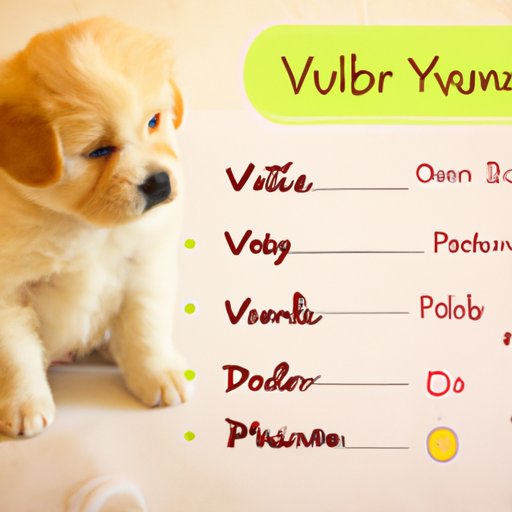Introduction
Proper nutrition is essential for puppies as they grow and develop into adulthood. Knowing what to feed a puppy, how much, and when can be confusing for many pet owners. This article will provide an overview of puppy nutrition and help you understand what your pup needs to stay healthy.
A Puppy’s Nutritional Needs: How Much Should They Eat?
When it comes to puppy nutrition, the most important factor is caloric intake. Puppies need more calories than adult dogs because they are still growing. The amount of calories needed varies depending on age, size, breed, and activity level. Generally speaking, puppies require approximately 30-50 calories per pound of body weight each day.
In addition to calories, puppies also need adequate amounts of protein and fat in their diets. Protein provides essential amino acids that help build and maintain muscle and other tissues. Fat provides energy and helps keep skin and coat healthy. Puppies should get at least 18-22% protein and 8-12% fat in their diets.
Vitamins and minerals are also important components of a puppy’s diet. These help support growth, immune system health, and other bodily functions. Puppies should get a balanced diet that includes all the essential vitamins and minerals they need to stay healthy.

Establishing a Feeding Schedule for Your Puppy
Once you have determined the type of food your puppy needs and the amount they should eat each day, you will need to establish a regular feeding schedule. Puppies should be fed two to three times a day until they are six months old. After six months, you can switch to one or two meals a day, depending on your pup’s individual needs. The amount of food given should be divided evenly between meals.

What to Consider When Choosing a Food for Your Puppy
There are many different types of dog food available, so it is important to choose one that meets your pup’s individual needs. Factors such as age, activity level, breed, and ingredients should all be taken into consideration when selecting a food for your puppy.
Puppies have different nutritional needs than adult dogs, so it’s important to choose a food specifically formulated for growth and development. Puppies should also get food that is high in protein and fat, as well as essential vitamins and minerals. Finally, read the ingredient list carefully to make sure the food does not contain any fillers or artificial additives.
The Cost of Feeding a Puppy: How Much Will You Need to Spend?
The cost of feeding a puppy varies depending on the type and quality of food you choose. Generally speaking, premium dry foods tend to be more expensive than canned or semi-moist foods. In addition, the amount of food needed will depend on the size and age of your puppy. Smaller puppies may need less food than larger ones, and younger puppies may need more food than older ones.
Understanding the Different Types of Puppy Foods Available
There are three main types of puppy food: dry, canned, and semi-moist. Dry food is the most common and is usually the least expensive option. It is usually made from ground grains, meat byproducts, and other ingredients. Canned food is usually higher in moisture and may be easier for some puppies to digest. Semi-moist food is a mix of dry and canned food and is typically higher in sugar and fat than the other types.

Tips for Ensuring Your Puppy Gets Enough Nutrition
It is important to make sure your puppy is getting enough nutrition to fuel their growth and development. Here are some tips for ensuring your pup gets the nutrients they need:
- Offer a variety of foods to ensure they get all the essential vitamins and minerals they need.
- Avoid overfeeding; too much food can lead to obesity and other health problems.
- Monitor your puppy’s weight regularly to make sure they are not gaining or losing too much.
What to Do if Your Puppy is Eating Too Much
If your puppy is eating too much, there are several things you can do. First, adjust their feeding schedule so that they are eating smaller meals more often throughout the day. Increase their exercise to burn off extra calories. Finally, if you are concerned about your puppy’s diet, talk to your vet for advice.
Conclusion
Puppies need proper nutrition to stay healthy and grow into adulthood. Knowing how much to feed your pup, what type of food to give them, and when to feed them is essential for providing them with the best care possible. Remember to take into account factors such as age, breed, and activity level when choosing a food, and monitor their weight regularly to make sure they are getting enough nutrition.
(Note: Is this article not meeting your expectations? Do you have knowledge or insights to share? Unlock new opportunities and expand your reach by joining our authors team. Click Registration to join us and share your expertise with our readers.)
